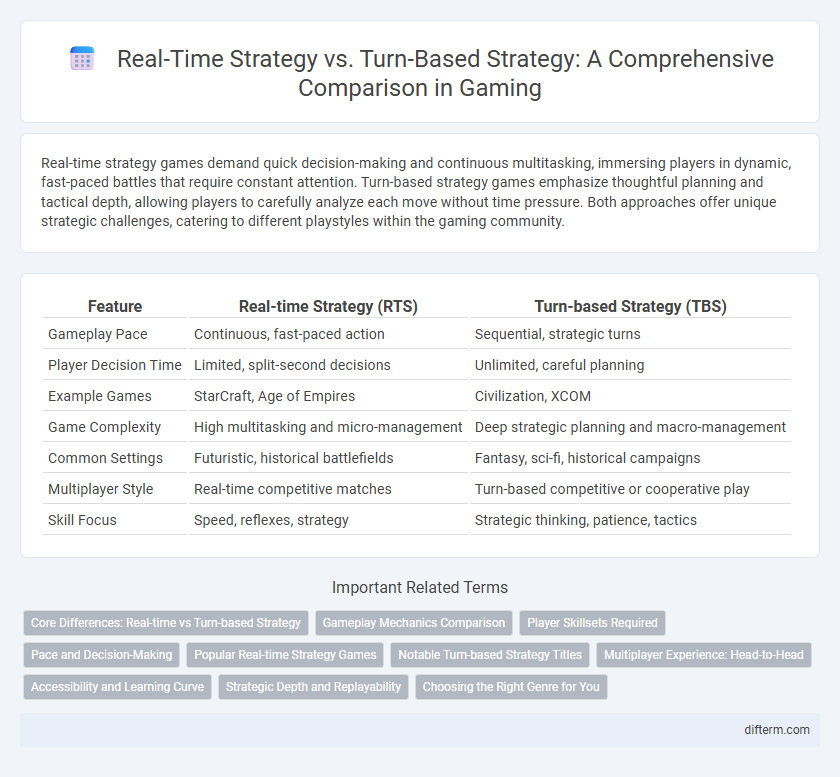Real-time strategy games demand quick decision-making and continuous multitasking, immersing players in dynamic, fast-paced battles that require constant attention. Turn-based strategy games emphasize thoughtful planning and tactical depth, allowing players to carefully analyze each move without time pressure. Both approaches offer unique strategic challenges, catering to different playstyles within the gaming community.
Table of Comparison
| Feature | Real-time Strategy (RTS) | Turn-based Strategy (TBS) |
|---|---|---|
| Gameplay Pace | Continuous, fast-paced action | Sequential, strategic turns |
| Player Decision Time | Limited, split-second decisions | Unlimited, careful planning |
| Example Games | StarCraft, Age of Empires | Civilization, XCOM |
| Game Complexity | High multitasking and micro-management | Deep strategic planning and macro-management |
| Common Settings | Futuristic, historical battlefields | Fantasy, sci-fi, historical campaigns |
| Multiplayer Style | Real-time competitive matches | Turn-based competitive or cooperative play |
| Skill Focus | Speed, reflexes, strategy | Strategic thinking, patience, tactics |
Core Differences: Real-time vs Turn-based Strategy
Real-time strategy (RTS) games emphasize continuous action and quick decision-making, where players simultaneously manage resources, units, and tactics without waiting for turns. Turn-based strategy (TBS) games prioritize strategic planning and careful consideration, allowing players to take discrete turns to execute moves and develop long-term strategies. The core difference lies in the pace and flow: RTS demands rapid multitasking under pressure, while TBS offers a deliberate, methodical approach to gameplay.
Gameplay Mechanics Comparison
Real-time strategy (RTS) games emphasize continuous resource management, unit control, and tactical decision-making without pauses, requiring players to react swiftly to dynamic battlefield conditions. Turn-based strategy (TBS) games allow players to plan moves thoughtfully within discrete turns, fostering deeper strategic analysis and precision in executing complex maneuvers. The gameplay mechanics distinction centers on pacing and decision timing, where RTS prioritizes speed and multitasking, while TBS emphasizes methodical planning and foresight.
Player Skillsets Required
Real-time strategy (RTS) games demand rapid decision-making, multitasking, and precise resource management under time pressure, emphasizing players' reflexes and situational awareness. Turn-based strategy (TBS) games prioritize strategic planning, long-term thinking, and tactical positioning, allowing players to analyze and predict opponent moves without time constraints. Mastery in RTS hinges on fast-paced adaptability, while TBS rewards careful deliberation and methodical execution.
Pace and Decision-Making
Real-time strategy (RTS) games emphasize fast-paced gameplay requiring quick decision-making and resource management under time pressure, fostering continuous player engagement. Turn-based strategy (TBS) games allow players to deliberate on each move without time constraints, promoting strategic depth and careful planning. The contrast in pace directly influences cognitive load and gameplay style, with RTS favoring rapid tactical responses and TBS encouraging long-term strategizing.
Popular Real-time Strategy Games
Popular real-time strategy games like StarCraft II, Age of Empires IV, and Warcraft III offer fast-paced gameplay that requires quick decision-making and resource management. These titles emphasize continuous action and multitasking over the more methodical and strategic planning found in turn-based strategy games like Civilization VI or XCOM 2. Real-time strategy games attract players who enjoy dynamic combat scenarios and rapid unit control, setting them apart within the broader RTS genre.
Notable Turn-based Strategy Titles
Notable turn-based strategy titles such as "Civilization VI," "XCOM 2," and "Divinity: Original Sin 2" emphasize strategic planning and resource management with each player taking turns to execute moves. These games highlight tactical depth, allowing players to carefully consider unit positioning and long-term strategies without the pressure of real-time decision-making. Turn-based strategy games typically offer complex storylines and extensive customization options, appealing to players who prefer a more methodical and thoughtful gaming experience.
Multiplayer Experience: Head-to-Head
Real-time strategy (RTS) games offer continuous, fast-paced multiplayer engagement, demanding quick decision-making and dynamic unit control to outmaneuver opponents in real time. Turn-based strategy (TBS) games provide a more methodical multiplayer experience, allowing players to contemplate moves and strategies without time pressure, fostering deep tactical planning. Head-to-head matches in RTS emphasize reflexes and adaptability, while TBS multiplayer highlights strategic depth and long-term resource management.
Accessibility and Learning Curve
Real-time strategy (RTS) games demand quick decision-making and multitasking, presenting a steeper learning curve that can be challenging for newcomers. Turn-based strategy (TBS) games offer a more accessible experience with slower pace and thoughtful planning, making them ideal for players seeking to develop tactical skills without time pressure. The accessibility of TBS titles often draws a broader audience, while RTS games appeal to those who enjoy intense, fast-paced gameplay dynamics.
Strategic Depth and Replayability
Real-time strategy (RTS) games offer intense strategic depth through dynamic decision-making under time pressure, requiring players to manage resources, units, and map control simultaneously. Turn-based strategy (TBS) games provide a slower, more calculated gameplay style that allows for intricate planning and tactical foresight, enhancing the complexity of each move. Replayability in RTS stems from unpredictable, fast-paced battles, while TBS games emphasize varied strategies and outcomes through diverse scenarios and deliberate choices.
Choosing the Right Genre for You
Real-time strategy (RTS) games demand quick decision-making, resource management, and multitasking skills, ideal for players who enjoy fast-paced, dynamic battles. Turn-based strategy (TBS) offers a more methodical approach, allowing time for careful planning and tactics, suited for those who prefer a thoughtful, measured gameplay experience. Assessing your playstyle, whether you favor adrenaline-driven action or strategic depth, helps in choosing the genre that maximizes your enjoyment and skill development.
Real-time Strategy vs Turn-based Strategy Infographic

 difterm.com
difterm.com